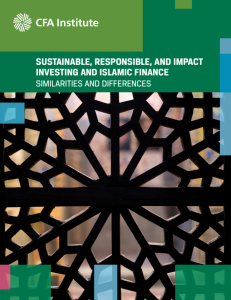Download here: https://www.cfainstitute.org/en/research/industry-research/sri-investing-and-islamic-finance
Overview
Islamic finance and sustainable, responsible, and impact (SRI) investing may appear to be completely unrelated approaches. Islamic finance prohibits riba (lending at risk) and excessive gharar (sale of risk). SRI investing has environmental, social, and governance (ESG) considerations at its core, but it still depends on conventional financial concepts of investing. Surprisingly, however, Islamic finance and SRI investing have profound similarities.
Although both approaches evolved in different cultural circumstances and separate historical periods, they share a focus on ethical considerations of stewardship and social responsibility. Moreover, some of the fundamental differences also provide ethical links between these two distinct modes of finance. For example, some prohibitions of Islamic finance are consistent with the negative screening approach commonly used by SRI investors. This publication examines the similarities and differences between Islamic finance and SRI investing and analyzes emerging points of convergence that favor the inclusion of ESG principles in Islamic finance. These trends could allow providers of financial services to create products that satisfy the criteria of both sets of investors.
About the Author(s)
Usman Hayat writes about sustainable, responsible, and impact investing and Islamic finance. He is the lead author of “Environmental, Social, and Governance Issues in Investing: A Guide for Investment Professionals”, and the literature review, “Islamic Finance: Ethics, Concepts, Practice.” He is interested in online learning and has directed three e-courses for CFA Institute: “ESG-100”, “Islamic Finance Quiz”, and “Residual Income Equity Valuation.” The other topics he writes about are macro-economics and behavioral finance. Previously, he was a content director at CFA Institute. He has experience of working in securities regulation and as an independent consultant. His qualifications include the CFA Charter, the FRM designation, an MBA, and an MA in Development Economics. His personal interests are reading and hiking.










